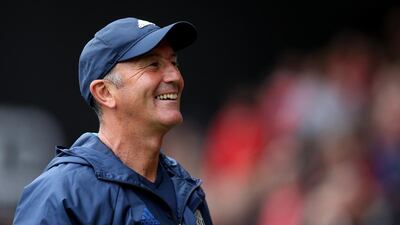Is there such a thing as securing safety too early? The millions on offer for each of the 20 teams at the start of each Premier League campaign is now almost symbiotic to each club’s prospects that relegation from it – in the most extreme cases at least – could threaten your club’s very existence.
Cementing top-flight status for a handful of clubs is as good as winning the title. The sooner its done, the better. Minds can rest easy, players contracts can be negotiated, transfer targets identified, budgets finalised and books balanced. The manager, his staff and players congratulated on a job well done.
There is another school of thought, though.
__________________________________
Read more
■ The best of rivals: Guardiola-Mourinho clash in Manchester derby
■ Title race: Tottenham keep pressure on Chelsea with victory over Crystal Palace
__________________________________
Let’s look at the cases of West Bromwich Albion and Waford, to use two examples. Two teams, both in the top half of the table (West Brom eighth, Watford 10th), who secured their survival with some six or seven games remaining.
The concern (and I use the word loosely) is that with their futures secured the players’ intensity in both training and matches will drop; the small details analysed to gain an edge over the opposition not scrutinised to quite the same degree; supporter numbers dwindle with little excitement to be found in mid-table.
West Brom are 14 points behind seventh-placed Everton, albeit with a game in hand, and, before last Thursday night’s encounter with Manchester City, 19 points behind Manchester United, who occupy fifth, the sole Europa League place up for grabs via the league. Short of winning their remaining five games, they will likely finish closer – in points – to the relegation places, of which they enjoy a 13-point cushion over 18th-placed Swansea City, than they will challenge the established order.
Similarly Watford hit 40 points, the mark historically seen as the benchmark for safety, with a 1-0 win against Swansea on April 15. Their following fixture, against relegation-threatened Hull City, ended in a 2-0 defeat to a team that played the majority of the match with 10 men following a soft red card to striker Oumar Niasse.
To sum up the team’s performance, one Watford supporter told this writer the team played better in two chastening defeats to Tottenham Hotspur, where they were demolished 8-1 on aggregate, than they did in last week’s insipid and uninspired display at the KCOM Stadium.
It is only logical that with the pressure that comes with ensuring Premier League safety that efforts would wane once it was secured. It should not be overstated either the achievement of Italian manager Walter Mazzarri in the fine job he has done at Vicarage Road in his first crack at the Premier League.
To answer the question more in depth though we must first examine each team’s goals at the start of 2016/17. For West Brom and, save for Leicester City, the soon-to-be deposed champions, every team below Watford in the table the aim will have been Premier League survival.
Some critics say that may lack ambition, but many have flown too close to the sun and scorched their wings. Since the first Premier League in 1992/93 only six teams have contested every season.
Of those that have chased unrealistic dreams, Leeds United nearly went out of existence, Wimbledon did, eventually rebranded as Milton Keynes Dons and relocated 90 kilometres away from their spiritual home in South London. Manchester City and Southampton both dropped two divisions before emerging as Premier League forces. Blackburn Rovers, champions of the top tier in 1995, look set to contest the 2017/18 season in its third. While Newcastle United secured an immediate return from the Championship, many more have fallen and are yet to return.
This is the reality of the Premier League. Leicester’s triumph last season was a one-off. Even perennial top-four finishers Arsenal are in danger of missing out on Uefa Champions League qualification, but the worst they will do is finish seventh.
That means ostensibly 10 places are up for grabs, with no one wanting to finish in the bottom three. In that regard, the likes Tony Pulis (West Brom), Sam Allardyce (Crystal Palace, 12th) and Mark Hughes (Stoke City, 11th) – survival specialists – are worth their weight in gold.
So, is there such a thing as securing safety too soon? No. Because while West Brom and Watford may have little left to play for, Hull, Swansea, Middlesbrough and basement dwellers Sunderland would swap places with them in a heartbeat.
Follow us on Twitter @NatSportUAE
Like us on Facebook at facebook.com/TheNationalSport


